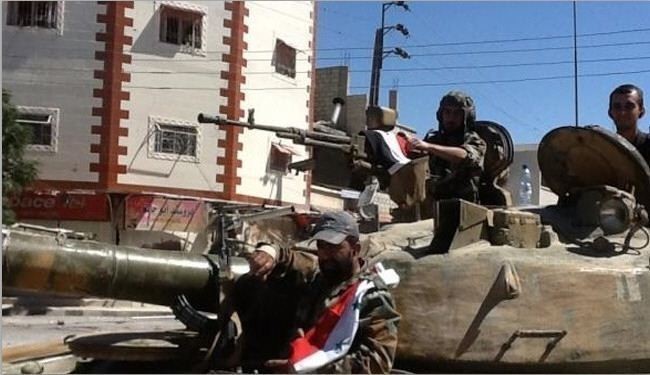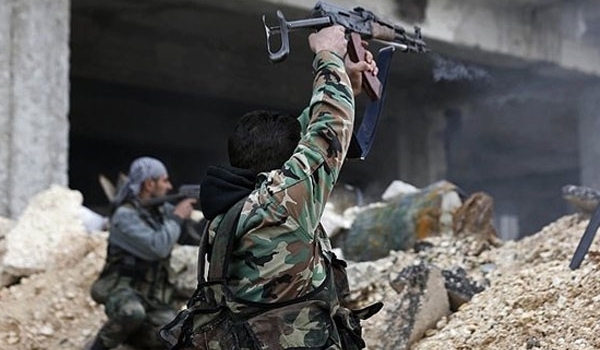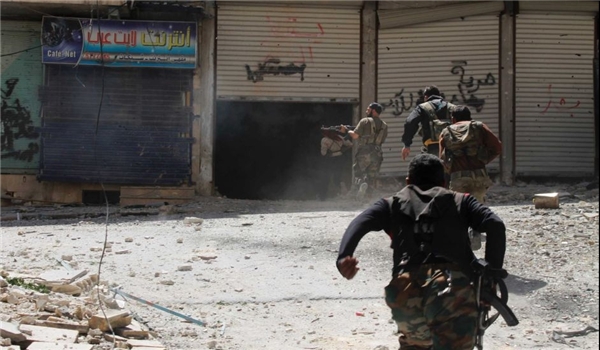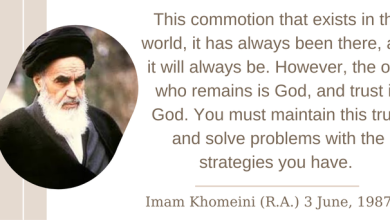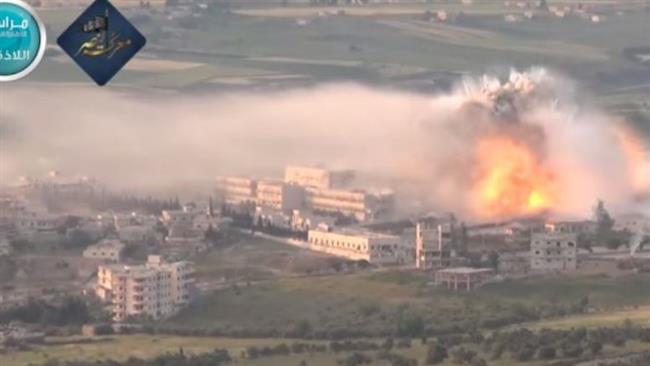Syria in Last 24 Hours: Army Preparing to Take Full Control of Aleppo City
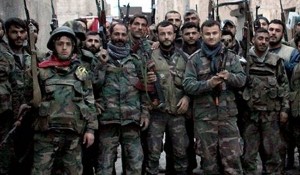
 The Syrian army units are preparing for a full-fledged war in the Northern city of Aleppo, reports said.
The Syrian army units are preparing for a full-fledged war in the Northern city of Aleppo, reports said.
After liberation of Aleppo prison the Syrian army ushered in a new era in its confrontations with the militants, military analysts said.
The army units have regained control of several strategic areas in Aleppo, including Tal Qazan as well as air defense bases and a major part of the region that was previously under fire by the militant groups.
Army units on Saturday carried out several operations against militants’ hideouts and concentration centers, killing scores of terrorists and injuring many others in several areas around Syria.
The army units killed a number of militants and destroyed their weapons in Bani Zaid, al-Haidariyeh, Old Aleppo, al-Oeijeh, al-Mansoura, Hanano, Maskana, Tal Sosin, Andan, al-Sbeiha, Kafar Dael, Kafar Kar, Kafar Khasher, al-Smeririeh, Babis and the industrial city in the countryside.
In Qunaitera, an army unit destroyed several vehicles with all militants inside in the villages of Ain al-Tina, al-Alia, Tal al-Mahes, Tal al-Jabia, al-Sawwaia and al-Hajja.
Army units targeted militants’ concentration centers in the villages of Haurata, Om Sharshouh, al-Tiba in Homs countryside, killing many militants and injuring others.
Meantime, the terrorist groups stationed in the Palestinian refugee camp, al-Yarmouk, in Damascus countryside prevented the dispatch of humanitarian aids, specially foodstuff, to the camp of residents despite a reconciliation agreement signed between them and the Syrian government.
The reconciliation agreement was concluded in al-Yarmouk Palestinian camp in Damascus and went into effect last Sunday, but a number of terrorist groups have voiced opposition to the deal and have remained in the camp.
According to the report, the Syrian government’s efforts to provide the 7,000-strong residents of Yarmouk with food cargos have failed by now due to the remaining terrorists’ opposition.
Meantime, as the Obama administration seeks $500 million in additional aid for Syrian rebels, a leading figure of the major US-backed Syrian opposition coalition has ordered the disbanding and complete restructuring of the group’s military wing.
The shake-up is the latest sign of disarray within the Syrian National Coalition, the exile-based opposition umbrella group backed by Washington and its allies. The Obama administration has touted the coalition as an alternative to the government of Syrian President Bashar Assad and has backed the group with funds and equipment.
Ahmad Tomeh, prime minister of the coalition’s opposition government, ordered the dissolution of the Supreme Military Council, which oversees the Free Syrian Army, the affiliated rebel faction fighting in Syria. He referred members of the military command to a financial and administrative oversight committee “for investigation.”
A statement late Thursday from Tomeh did not specify any charges of wrongdoing.
The recently appointed opposition military chief, Brig. Gen. Abdullah Bashir, was fired in the overhaul.
The move was meant in part to put the military campaign directly in the hands of Syria-based commanders, Tomeh said Friday in an interview with Al Arabiya, the Saudi-owned news channel.
The Syrian opposition group has long faced complaints that its leaders spend too much of their time in five-star hotels in Turkey and in allied Persian Gulf states, although Bashir was officially said to have been based in Syria.
Most commanders “no longer have a presence on the ground in Syria and live on Turkish soil,” said Tomeh, a dentist with a long history in Syrian opposition circles.
“A new force on the battlefield deserves to be represented,” Tomeh told Al Arabiya.
The overhaul drew condemnation from the ousted military leadership. In a statement, the former commanders described the decision as “irresponsible” and a “gross legal mistake.”
The shake-up is the latest upheaval in the ranks of the U.S.-backed Syrian opposition. US officials say they provide aid only to “moderate” rebel groups that reject Islamic extremism, support retaining a secular governing structure in Syria and respect the rights of Syria’s minority groups.
The Free Syrian Army has long been a major disappointment to its overseas sponsors. On the battlefield, its forces have been eclipsed by various hard-line Islamist opposition factions, including Al Qaeda-style groups. It has never been clear how many troops fight under the FSA banner or report to its command structure.
Formed in December 2012, the Supreme Military Council aimed to bring together disparate rebel groups under a unified command that would plan and execute military operations as well as oversee the distribution of weapons and funds. U.S. officials applauded the move.
Its creation was in part an attempt to reassure supporters in the United States and elsewhere who were alarmed about the rising influence of Islamist fighting formations, including the Al Qaeda-affiliated Al Nusra Front and its arch-rival, the Islamic State of Iraq and Syria, or ISIS.
But the US-backed Syrian opposition has complained repeatedly that Islamist factions are better funded and have superior arms.
A major blow to the pro-US “moderate” rebel movement came in December, when Islamist rebels seized stocks of U.S.-supplied “non-lethal” supplies that had been stored in warehouses along the Syria-Turkey border. Washington cut off some new aid deliveries for several months. Critics argue that there is no guarantee that weapons and other lethal aid provided to “moderate” rebels will not fall into the hands of Islamist militants.
Sweeping advances this month in Iraq by ISIS may have prompted the White House to bolster support for the Syrian opposition.
On Thursday, the Obama administration said it was asking Congress for $500 million in aid to train and equip “appropriately vetted elements of the moderate Syrian opposition,” according to a statement from the National Security Council.
Elsewhere, militants from the terrorist group of Al-Qaeda, along with western-backed Syrian rebels launched a counter-offensive to expel their former allies, the so-called Islamic State of Iraq and Levant (ISIL), from Albu Kamal town on the border with Iraq.
The operation came just days after some militants from Al-Qaeda’s Syria franchise, al-Nusra Front, pledged loyalty to ISIL in Albu Kamal, after it led an offensive in Iraq and seized chunks of territory.
But not all al-Nusra militants defected and those who refused to submit to the radical group joined forces with other militant groups to launch the counter-offensive.
According to the so-called Syrian Observatory for human rights fighting has raged since late last night in Albu Kamal between al-Nusra Front and other militant groups at one side and ISIL at the other.
ISIL and al-Nusra Front share same extremist views and both entered the war in Syria in 2011 with pledging loyalty to Al-Qaeda leader Aymen Zawahiri.
Power struggles later caused ISIL to turn into an enemy, and al-Nusra became Al-Qaeda’s representative in the Syrian war.
The background of the massive war in Syria which started in 2011, is marked with brutal executions and extremist acts of violence against civilians and Syrian soldiers, committed by al-Nusra and ISIL.
